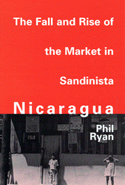 The Fall and Rise of the Market in Sandinista Nicaragua. Montreal: McGill- Queen’s University Press, 1995.
The Fall and Rise of the Market in Sandinista Nicaragua. Montreal: McGill- Queen’s University Press, 1995.
“Structure, Agency, and the Nicaraguan Revolution,” Theory and Society 29, no. 2 (Apr. 2000): 187-213.
This article takes aim at accounts of revolution as purely “structural” events. It also manages to cite both Kant and Dr. Seuss in a single endnote.
Duet for Peasant and Socialist Revolutionary, with Obbligato Feminism: Lessons of the Nicaraguan Case, Studies in Political Economy no. 46, Spring 1995, pp. 79-112.
(From the intro) In 1795, Beethoven wrote a short piece with the whimsical title, “Duet for Viola, Cello, and Two Obbligato Eyeglasses.” “Obbligato” denotes “a part which must not be omitted,” a part which is “essential to the structure, or at least to the effect” (Arnold 1983). This essay is about another duet: between the peasantry and the socialist revolutionaries of Nicaragua’s Sandinista Front for National Liberation (FSLN). The duet was, unfortunately, much less harmonious than those created by Beethoven. After losing power in 1990, many Sandinista leaders concluded that relations with the peasantry had been one of the great failures of the revolutionary process…
Peace and recovery: New president must live up to high expectations. Ottawa Citizen, April 25, 1990.
An op-ed piece written after the Sandinistas lost the 1990 elections.
“Teoría y Política de Precios en Nicaragua.” Working paper of the Departamento de Economía Agrícola, Universidad Nacional Autónoma de Nicaragua, Managua, 1987.
This article showed how the government’s price policies were contributing to high inflation.
“Nicaragua’s Economy: The Dilemmas of a Revolution at War,” Canadian Journal of Latin American and Caribbean Studies 11, no. 22, 1986, pp. 37-58.
Review of Hungry Dreams: The Failure of Food Policy in Revolutionary Nicaragua 1979-1990, by Brizio N. Biondi-Morra. In Economic Development and Cultural Change, April 1997, pp. 453-56.
